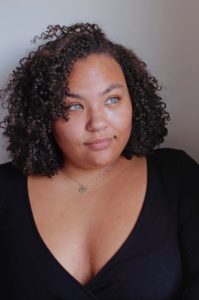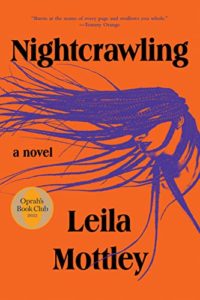The PEN Ten: An Interview with Leila Mottley
The PEN Ten is PEN America’s weekly interview series. This week, PEN America’s Literary Programs and Emerging Voices Assistant T.C. Mann speaks with Leila Mottley, author of Nightcrawling (Knopf, 2022). Amazon, Bookshop
1. What was the first book or piece of writing that had a profound impact on you?
Sassafras, Cypress and Indigo by Ntozake Shange was one of the first novels I remember having a really big impact on me because of how Shange innovates language in ways I had never seen before. It’s about three Black sisters, music, dance, motherhood, and home, and it was the first time I read a book where poetry and narrative collided in such a stunning and emotional rendering.
2. How does your writing navigate truth? What is the relationship between truth and fiction?
There’s an inherent element of truth in Nightcrawling, because it’s inspired by a few different true cases of police sexual violence and those very real examples were the foundation I used when thinking about plot. I wanted to showcase the real implications of the circumstances Kiara finds herself in, because I think writing about truth means creating honest depictions of the way in which the world functions. I also wanted to create a fictional world that feels as whole and real as possible and recognizable as our own, but I also wanted to lean into the ways in which fiction gives us the ability to see parts of Kiara’s life and emotional experience that we’re not always able to see in our own lives. The truth is in the core of the novel, even as the world and characters are fictional.
“I wanted to showcase the real implications of the circumstances Kiara finds herself in, because I think writing about truth means creating honest depictions of the way in which the world functions.”
3. What does your creative process look like? How do you maintain momentum and remain inspired?
I try to write my first drafts quickly in order to fully engross myself within my narrator and their world, since I’m able to produce my best writing when I can give it all of my attention. Remaining connected with my characters is vital to my process, so if I’m having an off day I find that spending time thinking about my work is just as important as actually sitting down and typing. I take space away from my work between writing and revision, but during the drafting process, when I’m writing between two and four thousand words a day, it can be a challenge to find the balance between consistency and creativity. I always write every day when I’m deep in the drafting process, usually trying to hit a word count or chapter marker, but I’ve been learning recently how to rest more and actually treat weekends like a break because I don’t write as well when I try to rush it. It’s all a game of balance and I’ll admit I’m not always the best at it.
4. What is one book or piece of writing you love that readers might not know about?
I love Bone Black, bell hooks’ memoir. Her more popular books like all about love or Feminism is For Everybody are wonderful, but I think she’s not given enough credit for the beauty of the writing in her memoir and how she depicts Black girlhood.
5. Which writers working today are you most excited by?
I just read Neruda On the Park, a recent debut by my friend Cleyvis Natera. I am eagerly awaiting whatever Jesmyn Ward does next. I really enjoyed Luster by Raven Leilani and I’d love to read more by her.
“Remaining connected with my characters is vital to my process, so if I’m having an off day I find that spending time thinking about my work is just as important as actually sitting down and typing.”
6. Which writer, living or dead, would you most like to meet? What would you like to discuss?
 I would absolutely love to meet Jesmyn Ward. I would like to talk about writing in first person with her, because not a lot of authors stick to first person after their debuts but I personally love the way she does it and I prefer it for my own writing. I think that she is such a master of writing in first person, so I’d like to know more about why she uses it and what she thinks about it in terms of connecting to characters as well as form and structure.
I would absolutely love to meet Jesmyn Ward. I would like to talk about writing in first person with her, because not a lot of authors stick to first person after their debuts but I personally love the way she does it and I prefer it for my own writing. I think that she is such a master of writing in first person, so I’d like to know more about why she uses it and what she thinks about it in terms of connecting to characters as well as form and structure.
7. Why do you think people need stories?
Stories expand our ideas of our world, or reflect back to us our place in it. The best kind of stories are ones that give us information about ourselves, that can show us something about how we think or what kind of art we consume or who we’d like to be. I think they subconsciously form our conceptions of our world and that’s why it’s so important that we continue to center stories that have historically been pushed to the margins.
8. The City of Oakland becomes a character unto itself. Can you tell us how and why you decided to develop the city in this way?
Oakland is a unique and special place, but so many outsiders depict Oakland as a dangerous city or an up-and-coming area for techies to move to and gentrify. I wanted to write about Oakland the way I know it and see it, disregarding each of these false characterizations and writing it as a rich, vibrant, alive world that has a personality so big that you can’t help but feel like it’s a character in your life.
“The best kind of stories are ones that give us information about ourselves, that can show us something about how we think or what kind of art we consume or who we’d like to be.”
9. Kiara’s strongest relationships are with the men in her life. How do these relationships inform Kiara’s character and her decisions?
Kiara is raised in a context in which men and their needs are centered, and it’s the job of the women around them to look out for the men first and foremost. Kiara’s relationship to the men in her life is complicated, because she has a deep love for them, especially for her brother and neighbor and the men she chooses to love, but she must also reckon with the challenge that comes with being unable to think about herself when these men demand that she takes care of them first. Because of this, Kiara doesn’t feel entitled to her own dreams, which impacts every choice she makes (or doesn’t make) in the novel.
10. A recurring symbol throughout Nightcrawling is the “shit pool.” What is the significance of the pool to the overarching story?
The pool—and water in general in Nightcrawling—represents the dualities in Kiara’s life that she is constantly grappling with. She can love something that is harming her, need things that hurt her, want something and feel unable to have it. The pool is about seeing two sides of the same coin: The pool represents a haven for her, particularly when she is with Trevor, the little boy next door, but at the same time, it is connected to some of the most devastating moments of her life, and quite literally filled with shit. It represents how everything around her is tainted by the system, the men who exploit her, and the myriad of circumstances entirely outside of her control.
Leila Mottley is the 2018 Oakland Youth Poet Laureate. Her work has been featured in The New York Times and Oprah Daily. She was born and raised in Oakland, where she continues to live. Nightcrawling is her first novel.






